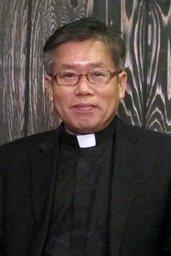Taking up my cross
By Nicole Melki
Dec. 1, 2017

Courtesy photo of Nicole Melki.
As an LBGTQ person in The United Methodist Church, I have felt the impact of Scriptures that have been used to communicate exclusion from the love of God. One particular passage sticks out as I have been asked to write about what it means to follow Jesus, which can be found here. I cannot count how many times I have heard that I should deny myself and take up my cross to follow Jesus — meaning I should give up being gay as an act of self-denial.
I have encountered many problems with this passage being used this way. One, it assumes that being LGBTQ is something that will go away if I simply deny it. In my own personal story, I spent three years in turmoil praying and crying myself to sleep at night trying to deny my orientation. After those three lonely years, I realized my prayers were answered and that being gay was a blessing instead of a curse. It was not something that I needed to deny, and that self-denial was much larger than my personal self.
In my own story, I realized that carrying my cross and following Jesus meant remaining in the church despite the messages that I was not a member of the Beloved Community. My cross to carry has nothing to do with being gay as an orientation, but rather being gay and staying in the church. Denying myself has meant staying and standing with my LGBTQ siblings in the church despite the hardship and oppression endured. Taking up my cross and following Jesus has meant being willing to speak up, stand up and carrying my LGBTQ siblings when the church defined us as Other through its institutional policies that negate the fullness of our humanity.
Following Christ has meant knowing that my story and pain is larger than me, and the continual carrying of the cross has the promise of resurrection at the other end. Denying myself has meant seeing my story as a part of the larger whole. Instead of abandoning myself or those like me, I have taken a vow to be a part of the resurrection and the life.
One story I have really connected with is the woman with the issue of blood, which can found here. She knew how to take up her cross and follow Christ despite the hardships that surrounded her life. Her story parallels many LGBTQ people in the church. Many of us bleed from the pain of rejection and harmful theology. Some of us may have gone to many doctors or therapists seeking to stop this bleeding by either attempting to deny our orientation or heal the wounds caused by the church. We have carried this burden, becoming weary in our journey, wondering if there is any hope. Yet, like this brave woman, we persevere through the crowds that have not been in our favor. Just as the woman with the issue of blood would have been seen as unclean, so have LGBTQ people. But this did not stop her from following Jesus, and it should not stop us.
Her will to follow Jesus despite the narrative that was constructed about her was so powerful that Jesus felt the power leave him. Her will to be healed was in the confidence that she too was a member of the Beloved Community, and it was that will to be whole after the harm done to her that even awakened Jesus as he felt the power leave him. Her healing and wholeness came from the sheer faith that her personhood and dignity mattered enough to stay with herself, not abandon it.
There is a distinct difference between abandoning one’s self and denying one’s self. To abandon myself would mean that I would believe the untruth that I am not, as an LGBTQ person, a part of the Beloved Community. To deny myself means staying in the church despite the pain, so that I might stand with and for others. To take up my cross and follow Jesus means having the faith of the woman with the issue of blood, pushing through with every fiber of my being. It means knowing that my choice to stay in the church despite the pain I feel is bigger than myself. Following Jesus means staying when I have been told to leave. Following Jesus means embracing the love I believe God has for all of my LGBTQ siblings, and committing to walking when they cannot. Following Jesus means the belief that one day my beautiful siblings and I will be fully recognized in The United Methodist Church — not only as compatible with Christian teaching, but as exemplary models of faith.
Nicole Melki, a graduate of Perkins School of Theology at Southern Methodist University, is the executive director of Ubuntu Music Project, an afterschool strings program for underserved students in Dallas.
Return to the Many Voices, One Faith home page
Like what you're reading? Support the ministry of UM News! Your support ensures the latest denominational news, dynamic stories and informative articles will continue to connect our global community. Make a tax-deductible donation at ResourceUMC.org/GiveUMCom.




